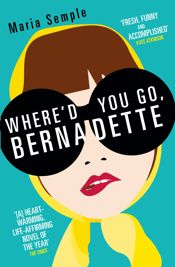Where’d You Go, Bernadette

This is a contemporary novel, which I normally would have no reason to read, but I believe it was recommended to me because of its format. The story is mainly told through “found media” items, interspersed with traditional narrative sections.
By “found media,” I mean emails, letters, faxes, texts, etc. The book is essentially a collection of correspondence between people, from which you draw out the story and discover the plot.
(I’ve since learned that – when used in film – this is a format called “screenlife” or “found footage”)
It’s a neat format, and I enjoyed that aspect of the book very much.
The story is about a woman who may or may not be going slightly off the rails. Bernadette was once a famous architect who had a professional issue and dropped out. She lives her wealthy husband in Seattle, and has a daughter, Bea. Lots of things happen, and people become concerned for Bernadette’s sanity. Then she disappears.
Warning: spoilers below –
The book set up her disappearance like it was unexplained. The father and daughter have a conversation early in the book where the father tries to explain to the daughter why her mother left and that it wasn’t her fault (most of the rest of the story is told as a series of flashbacks).
Then, about two-thirds of the way through, this is explicitly mentioned.
I laughed because I knew Mom would think it was funny that now I was the one crying. I looked up. But she was gone. It was the last time I saw her.
But it’s a lie. She does see her mother again. In fact, there’s a kind of anti-climactic, Hallmark-esque reunion at the end. I re-read this passage a few times, but I can’t see how the author didn’t straight up mislead the reader.
And that really annoyed me. I felt manipulated by the book.
However, the “found media” aspect is very neat. Many plot points are told just as residual emails or texts that people send to each other after-the-fact, and you feel like a bit of a detective piecing everything together.
But, again, the plot was ruined for me at the end.
Postscript
Added on
This might be termed an “epistolary novel,” a term I learned when reading about The Color Purple. Wikipedia has an entire list of notable epistolary works, in which this novel does not appear, but its format seems very similar to some of the works noted.
Book Info
- I have read this book. According to my records, I completed it on .
- A softcover copy of this book is currently in my home library.